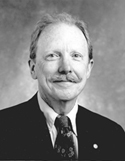|
 February marked the 60th anniversary of the fall of Singapore to the Japanese in World War II, and the event was marked by an international conference of historians and scholars sponsored by the National University of Singapore. February marked the 60th anniversary of the fall of Singapore to the Japanese in World War II, and the event was marked by an international conference of historians and scholars sponsored by the National University of Singapore.
Raymond Callahan, associate dean of the College of Arts and Science and the author of “The Worst Disaster: The Fall of Singapore,” first published in 1977 by the University of Delaware Press, was among the invited speakers at the conference, where he focused on Winston Churchill’s role in Singapore’s defeat. It was Callahan’s first visit to the city.
“The fall of Singapore was a pivotal event with enormous consequences,” Callahan said. “Not only was it a military defeat, it was a shattering blow to Great Britain’s prestige and marked the decline of the Western era in Southeast Asia, which ended when the last helicopter left Saigon.”
Callahan’s book had been out of print for many years so he was surprised to get a call from a Singapore publisher, Cultured Lotus, which wanted to publish a new edition of “The Worst Disaster” in conjunction with the conference.
This meant extensive research and rewriting, Callahan said, as previously closed archives were now opened, containing new information about the events that led to the downfall of Singapore.
“When I first wrote the book, one important source in the 1970s was talking to those who had survived the downfall of Singapore, and some of them are no longer alive,” Callahan said. “Although new material, such as Churchill’s papers and information about Japanese intelligence and strategy, have shed new light on all that took place, my basic premise that what happened in Singapore was the result of decisions made in London, primarily by Churchill, still is valid.”
In the preface to the earlier edition, Callahan wrote, “Not villains, but inescapable dilemmas prepared the way for this most spectacular of British military disasters.”
He wrote that Churchill saw “clearly that Britain could fight one war or lose two,” and that the war in Europe and Africa was his priority.
Churchill was aware of what was happening in Singapore and gambled that the Japanese would not attack and that the U.S. would intervene, neither of which happened, according to Callahan. The ultimate result was “the British, like the Dutch and the French, found that there could be no true restoration of their power in the East after 1945,” he wrote.
In his papers, Churchill did not dwell on the city’s defeat, but in a note he said he would make the same decision again not to send the extensive reinforcements that were needed to defend the city and area, Callahan said.
The relationship between Great Britain and Australia underwent a fundamental change after Singapore, Callahan said. “Australia had relied upon Great Britain to defend it and learned that it could no longer depend on that happening.
 Australia also lost 25 percent of its army in Singapore, and Indian Army units also sustained large casualties with soldiers from both becoming prisoners of war. A June 1942 report saying that the Australian army was undisciplined and did not fight well was declassified in 1992, adding to Australia’s disillusionment,” he said. Australia also lost 25 percent of its army in Singapore, and Indian Army units also sustained large casualties with soldiers from both becoming prisoners of war. A June 1942 report saying that the Australian army was undisciplined and did not fight well was declassified in 1992, adding to Australia’s disillusionment,” he said.
“In essence, Australia grew from being an adolescent country to an adult one that is totally independent. I am sure, at the conference, Australian scholars will have much to say about the fall of Singapore from their point of view.
“Singapore is now a thriving, independent city state with an overwhelmingly Chinese population,” Callahan said. “While the memory of the fall of Singapore has faded in Europe, it does not fade there. When the Japanese invaded the city, they massacred thousands of Chinese, and this has not been forgotten.”
Callahan is a member of the board of governors of the Association of Churchill Fellows at Westminster College, where Churchill made his famous “iron curtain” address. A graduate of Georgetown University, Callahan received his doctorate from Harvard University and joined the UD faculty in 1967.
Recipient of a UD excellence-in-teaching award, he was a visiting professor of military history at the U.S. Army Command General Staff College and has lectured at other war colleges. The author of “Burma 1942-45” and “Churchill: Retreat from Empire,” he is now working on “Churchill’s Generals” for the University Press of Kansas.
April 18, 2002
|

